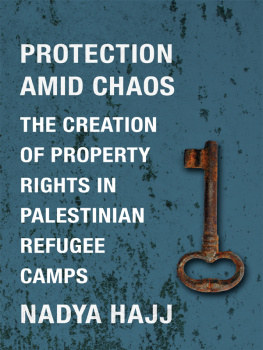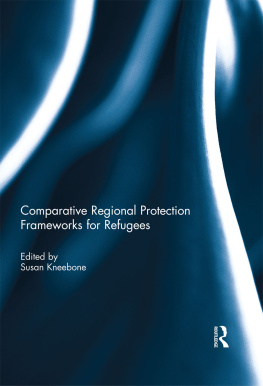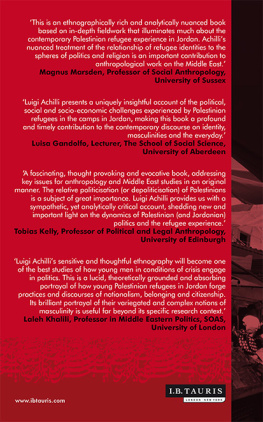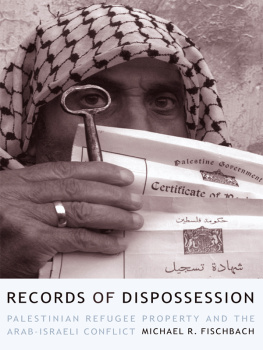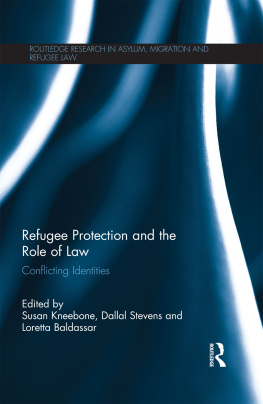Table of Contents
PROTECTION AMID CHAOS
COLUMBIA STUDIES IN MIDDLE EAST POLITICS
COLUMBIA STUDIES IN MIDDLE EAST POLITICS
MARC LYNCH, SERIES EDITOR
Columbia Studies in Middle East Politics presents academically rigorous, well-written, relevant, and accessible books on the rapidly transforming politics of the Middle East for an interested academic and policy audience.
The Arab Uprisings Explained: New Contentious Politics in the Middle East, edited by Marc Lynch
Sectarian Politics in the Gulf: From the Iraq War to the Arab Uprisings, Frederic M. Wehrey
From Resilience to Revolution: How Foreign Interventions Destabilize the Middle East, Sean L. Yom
PROTECTION AMID CHAOS
THE CREATION OF PROPERTY RIGHTS IN PALESTINIAN REFUGEE CAMPS
NADYA HAJJ
Columbia University Press
New York
Columbia University Press
Publishers Since 1893
New York Chichester, West Sussex
cup.columbia.edu
Copyright 2017 Columbia University Press
All rights reserved
E-ISBN 978-0-231-54292-0
Library of Congress Cataloging-in-Publication Data
Names: Hajj, Nadya, author.
Title: Protection amid chaos: the creation of property rights in Palestinian refugee camps / Nadya Hajj.
Description: New York: Columbia University Press, 2017. | Series: Columbia studies in Middle East politics | Includes bibliographical references and index.
Identifiers: LCCN 2016015785 (print) | LCCN 2016020769 (ebook) | ISBN 9780231180627 (cloth: alk. paper) | ISBN 9780231542920 (electronic)
Subjects: LCSH: Refugee property, PalestinianLebanon. | Refugee property, PalestinianJordan. | Right of propertyLebanon. | Right of propertyJordan. | Refugee campsLebanon. | Refugee campsJordan. | Palestinian ArabsClaims.
Classification: LCC KMK2695.P35 H35 2017 (print) | LCC KMK2695.P35 (ebook) | DDC 323.4/6091749274dc23
LC record available at https://lccn.loc.gov/2016015785
A Columbia University Press E-book.
CUP would be pleased to hear about your reading experience with this e-book at .
Cover design: Lisa Hamm
for Baba, Mama, Patrick, and Leila
CONTENTS
FIGURES
MAPS
TABLE
I began field research in the summer of 2004 and completed my last interview in June of 2012. Over the course of those eight years, many people made this project possible. Linda and Hatim Hajj, aka Mama and Baba, provided me with enormous support. Baba was my research aide and transcriber on many trips. His intimate knowledge of camp life and his technical background helped me orient my research. Mama sent encouraging emails and kept me going when things got tough. Patrick, my husband, anchored me during the endeavor and kept the home fires burning while I spent time away. Leila, my daughter, provided the best distraction from writing and the most potent motivation for finishing the project. Elaine and Ray encouraged me to finish writing even when it got hard. The entire Hajj family in Jordan, Lebanon, and Syria kept me fed, hydrated, laughing, and safe during my research. I am lucky to have so many cousins. Thank you.
Many colleagues helped improve the manuscript. At Emory University, Rick Doner, Thomas Remington, Carrie Wickham, and Tracy Yandle provided good ideas during the earliest inception of the research. The Political Science Department at Emory provided helpful research funding in 2004, 2005, and 2007. I am also thankful for the generous research support that Wellesley College offered me as a new faculty member. This support made it possible for me to complete the last iteration of interviews in 2012. In addition, the Northeast Middle East Political Science Working Group meetings in 2012, 2013, and 2014 were the best. I found my tribe of scholars that shared my passion for everything to do with the Middle East and political science. The whole crew of senior and junior scholars provided critical and helpful feedback that made a real difference in how I thought about my research. The careful reviews I received from Melani Cammett, Amaney Jamal, Marc Lynch, Jeannie Sowers, and many others at the Project on Middle East Political Science Junior Scholars Conference in 2014 propelled this research to a much better place. The Journal of Comparative Politics generously permitted me to reprint a portion of a previously published article: Institutional Formation in Transitional Settings. The anonymous reviewers and my editor, Anne Routon, helped polish the manuscript and make it a book. Thank you.
Finally, I am thankful to the hundreds of Palestinians that shared their stories with me. I am honored. You deserve a voice and I hope I did it justice. Of course, those who helped me shoulder no blame for any errors, omissions, interpretations, or conclusions in this book. I take responsibility for those.
Nadya Hajj
CC | Camp Committee, Lebanon |
CSIC | Camp Services Improvement Committee, Jordan |
DFLP | Democratic Front for the Liberation of Palestine |
DPA | Department of Palestinian Affairs, Jordan |
GAPAR | General Administration for Palestine Arab Refugees, Syria |
GUPS | General Union of Palestinian Students |
GUPW | General Union of Palestine Workers |
NBC | Nahr al-Bared Camp |
NIE | New Institutional Economics |
PARI | Palestinian Arab Refugee Institute, Syria |
PFLP | Popular Front for the Liberation of Palestine |
PLO | Palestine Liberation Organization |
UAR | United Arab Republic |
UN | United Nations |
UNCCP | United Nations Conciliation Commission for Palestine |
UNHCR | United Nations High Commission on Refugees |
UNRWA | United Nations Relief and Works Agency |
Throughout the book, I use a modified version of the International Journal of Middle East Studies transliteration system guidelines while retaining transliterations of Palestinian place names and figures.
P roperty rights are not supposed to exist in Palestinian refugee camps. At least the existing scholarly record does not predict their presence. After all, why would a marginalized community living in uncertain political economic conditions go to all the trouble and effort of crafting institutions that lay claim to assets in a refugee camp? Yet a routine interview with a Palestinian refugee led to the discovery of formal legal titles inside refugee camps strewn across Lebanon and Jordan. The discovery triggered a new understanding of the potential for institutional innovation and evolution in transitional political landscapes, places that lack a stable sovereign state with the legal jurisdiction to define and enforce institutions.

